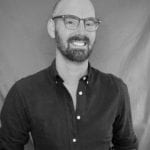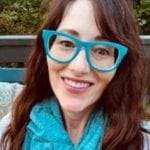Faculty reflect on the NHC podcasting institute
 I feel incredibly grateful for the opportunity to participate in the National Humanities Center’s Virtual Podcasting Institute June 10–14. The combination of reflexive sessions, technical training, and group work provided me with a strong foundation from which I hope to draw as I set out to produce a podcast in association with the journal Comparative Literature.
I feel incredibly grateful for the opportunity to participate in the National Humanities Center’s Virtual Podcasting Institute June 10–14. The combination of reflexive sessions, technical training, and group work provided me with a strong foundation from which I hope to draw as I set out to produce a podcast in association with the journal Comparative Literature.
During the week, I worked with four scholars from Willamette University, UC Berkeley, and Portland State to produce a model podcast. In this hands-on process, we not only learned how to operate sound editing software and various audio technologies, we also learned constructive ways to collaborate to promote humanities research. Each of us took part in the sound editing of the podcast, allowing us to gain skills and experience that we will each take into our future projects.
The training will help me to develop a podcast for the journal of Comparative Literature. I will begin the first set of interviews this summer. Comparative Literature has been based at the University of Oregon since its founding in 1947, and it remains the key academic journal in our discipline, representing scholars from across the world in conversations ranging from pre-Islamic poetry to the contemporary South Asian novel to experimental theater in London. The podcast will provide a holistic introduction to key scholars in comparative literature. Each episode will feature a scholar reflecting on a specific passage or detail from their work, followed by a discussion of how this specific detail connects to their training as a scholar and their understanding of the discipline more broadly.
The podcasting institute was invaluable in giving me a basic skill set with which to proceed. I benefited from the pragmatic discussions of how to publish and circulate a podcast in the humanities, and I appreciated the immediate tech consultations that the institute staff provided.
Through this experience, I have gained heightened appreciation for academic work across different media—be it podcasting, website design, or video, and I feel more strongly equipped to embrace how these platforms are part of our broader goal as humanities scholars to think, connect, and translate the conversations we have in our subfields to audiences more widely. I hope to use this training to incorporate exercises and techniques for podcasting in the classes I teach here at the UO. I appreciate the pivotal role that the Oregon Humanities Center plays in supporting these initiatives, and I extend a very heartfelt thank you for having given me this remarkable opportunity.
—Michael Allan, associate professor, Comparative Literature
 The podcast institute was both rewarding and challenging! I honestly had no idea how much went into producing a professional podcast. We learned the basics of recording, editing, and adding music in addition to workshops and presentations by successful academic podcasters. One of the speakers shared his experience in applying his academic podcast research to his tenure file. I am very excited about this possibility. I am overall very appreciative for the opportunity to attend and receive the equipment I need to start my own podcast. I still have much to learn but this gives me more confidence to get started!
The podcast institute was both rewarding and challenging! I honestly had no idea how much went into producing a professional podcast. We learned the basics of recording, editing, and adding music in addition to workshops and presentations by successful academic podcasters. One of the speakers shared his experience in applying his academic podcast research to his tenure file. I am very excited about this possibility. I am overall very appreciative for the opportunity to attend and receive the equipment I need to start my own podcast. I still have much to learn but this gives me more confidence to get started!
I am planning to call my podcast “Grounded: A Plant-Based Podcast.” As a food historian teaching in Global and Food Studies, I want my episodes to explore the history of food in general with a focus on nutrition, global health, and longevity. I’m hoping one or both of my sisters will regularly record with me to add a fun, relatable (and hopefully interesting) dimension of growing up in a vegetarian household.
—Hannah Cutting-Jones, instructor, Global Studies and Food Studies